News & Events in Belarus
Lukashenko outlines strategic directions of Union State development
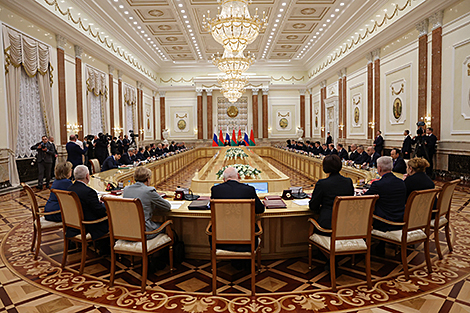
MINSK, 6 December (BelTA) – Belarusian President Aleksandr Lukashenko outlined several strategic directions of further development of the Union State of Belarus and Russia at a session of the Supreme State Council of the Union State in Minsk on 6 December, BelTA has learned.
"First of all, we need to drop the burden of issues which we have been unable to address for years. We have such problems. Vladimir Vladimirovich [Putin] said at a meeting in Moscow yesterday: don't be afraid to share where you have failed - people will understand. I believe that the number one task for us is to implement a common economic policy and ensure equal rights for citizens in our union space. We have not yet managed to reach the level of self-sufficiency and independence of our association, at which we could plan long-term development and would be protected from the external environment and various challenges," the head of state pointed out.
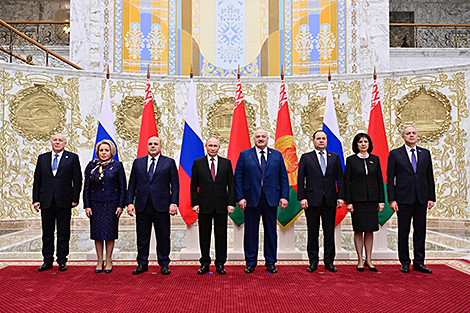
On a common economic policy
According to the president, the tools for solving this task are clear: a coordinated industrial policy, common approaches to ensuring food security, a common energy market, systematic achievement of technological sovereignty and efficient import substitution. It is also important to remove the remaining obstacles in bilateral trade.
"We have already started implementing joint projects in such areas as microelectronics, machine tool building, aircraft building, shipbuilding. But so far we are not moving fast enough. As of today, we have only 27 import-substituting projects underway. I think that for the joint market of Belarus and Russia, which is estimated at $2 trillion in total GDP terms, this figure should be hundreds of times higher," Aleksandr Lukashenko noted.
The president pointed out that both Belarus and Russia will benefit from such projects. Thanks to manufacturing cooperation, both countries create new jobs and new innovative products.
Another significant step in development of the Union State was the agreement on establishment of a common electricity market. "For the equal and fair economic environment, we look forward to launching common markets for natural gas, oil and petroleum products as soon as possible," the Belarusian leader said.
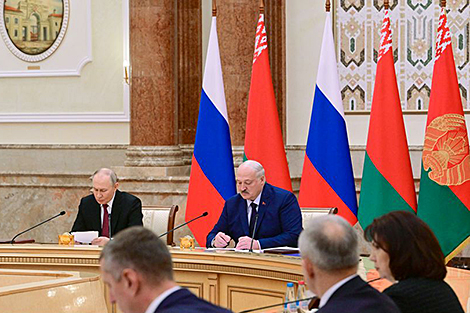
On ensuring equal rights of citizens
Whatever goals Belarus and Russia may pursue as the countries build the Union State, its main target audience is its citizens, Aleksandr Lukashenko stressed.
“Those, who believe in us, trust us, expect us to attentively respond to their needs and requirements. This is why ensuring equal rights of citizens of Belarus and Russia is a special matter,” the head of state noted. “Over the last quarter of a century a lot of problems have been resolved in migration, in social and labor relations, in healthcare.”
For instance, there are no restrictions on travels in the territory of both states. Equal rights have been ensured in labor activities, the recognition of work records, and workplace health and safety. Matters concerning pensions and social security have been addressed. All citizens are granted emergency medical aid and first medical aid if necessary. In 2023 alone about 60,000 citizens of Russia received medical aid in Belarus. Support is granted to families with kids and individual population categories.
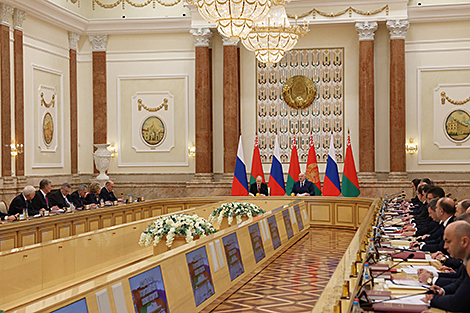
“We are particularly glad about the fact that on any festive days and on the whole Belarus is the most attractive country for tourist trips of such a gigantic country as Russia is,” the president said. “But a lot has yet to be done. Every person should feel all the advantages of our union in practice and without restrictions.”
On transport and logistics
Aleksandr Lukashenko stressed that Belarusian export cargoes are now shipped through Russian ports, which has resulted in mutual benefits. On the one hand, this solved Belarus' issue of export logistics. On the other hand, it significantly boosted the profits of Russian companies.
"But we still have a huge untapped potential. The implementation of the Northern Sea Route project is next in line. We have already tried to transport cargoes along this route. It was successful," the president said.
Russian partners are also working on a pilot project to create a high-speed railroad between Moscow and St. Petersburg. "We expect it to be extended along the Moscow-Minsk route. Your statement, Vladimir Vladimirovich [Putin], about the construction of such a high-speed route from Moscow to Brest through Minsk has encouraged the Belarusians, because so many people travel from Minsk to Moscow. Not long ago we were forced to add two more trains," the head of state noted.
On political and military security
“The recent developments make us pay special attention to the defense capabilities of our states. With the signing of the Union State Security Concept and the interstate treaty on security guarantees, we are reaching an unprecedented level of strategic alliance and coordination in the military sector,” Aleksandr Lukashenko said.
According to him, this will prevent violation of the territorial integrity of Belarus and Russia, help preserve sovereignty and independence, and, most importantly, ensure guarantees of a peaceful life for the citizens of both states.
"But our intention to sign this treaty has made our, as you said, 'partners' in the West overly excited. This is probably not a bad thing, because they have noticed us," the president said.
On labor force
The head of state stated that every year the Russian labor market attracts a significant number of Belarusians, which leads to a labor shortage in Belarus.
"Russia has the same problem. We need to develop a coordinated policy in this area and efficient legal mechanisms that will meet the interests of both sides," the Belarusian leader emphasized.
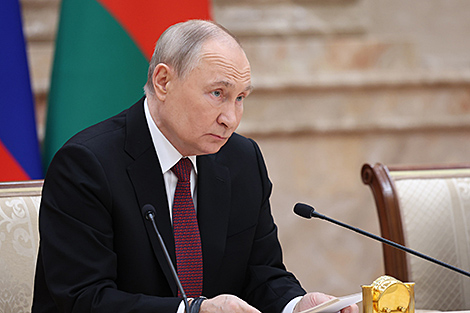
Aleksandr Lukashenko added that the agenda of the Union State always includes special topics. In May 2025, Belarusians and Russians will celebrate the 80th anniversary of the Victory in the Great Patriotic War of 1941-1945 together with other peoples of the former USSR, with those who share the same values.
"This is the most important date for our people who are linked by a common history, spirit and culture. Like our ancestors did 80 years ago, in Red Square on 9 May we will commemorate together the victims of that terrible war and celebrate the important anniversary of the historic victory of the Soviet people over fascism," the president said.
Aleksandr Lukashenko pointed out that as always the agenda of this session was extensive. It included specific issues of concern to the residents of both countries, which will help improve conditions, in which the economies operate, and strengthen the security of Belarus and Russia.







 print version
print version make home page
make home page add to bookmarks
add to bookmarks

